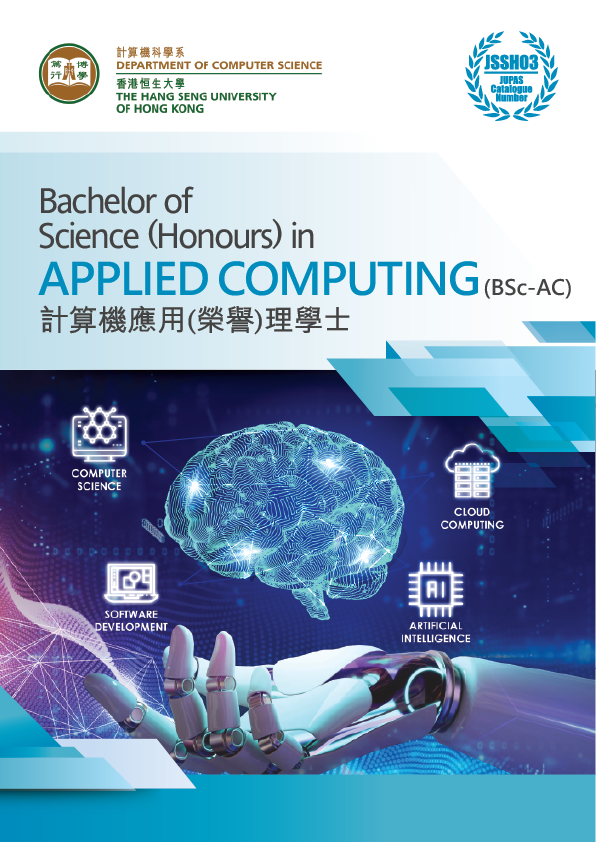BSc (Hons) in Applied Computing – Programme Structure
BSc (Hons) in Applied Computing – Programme Structure
Detailed Programme Structure (2021/22 onwards) and Program Graduate Profile
Programme Graduate Profile
BSc-AC is a four-year programme and there will be two semesters of 14 weeks per year. Students will be required to complete at least 40 modules (120 credits) over the four years. Each module consists of 3 credits, except the Senior Project which consists of 6 credits, and year-1 and year-2 English modules, which worths 2 credits each.
Programme Objectives
- To develop students’ creativity, critical thinking, analytical ability and problem-solving skills in a multi-disciplinary environment.
- To cultivate students’ interpersonal and communication skills in preparation for them to take up leading roles in their careers.
- To encourage students to learn independently and think critically, and to become autonomous learners for life-long learning.
- To provide students with a solid foundation of the conceptual, theoretical and practical knowledge in the field of computer software development, supplemented with knowledge from arts, humanities and business.
- To develop students’ ability to produce efficient and reliable IT solutions with due consideration of related ethical issues.
- To develop students’ ability to produce human-centred designs with visually appealing user-interface, functionality, usability, user-friendliness and positive customer experience.
- To enhance students’ awareness of art, culture and marketing in the practice of user experience design.
Programme Intended Learning Outcomes
- Address professional and personal challenges through the application of multi-disciplinary knowledge acquired.
- Communicate effectively in academic and business-related contexts, and in a team with effective social and interpersonal skills.
- Learn independently and think critically, and manage independent lifelong learning.
- Apply knowledge and theories to solving computing problems in the software, business and creative industries.
- Produce efficient and reliable IT solutions with good documentation practice and due consideration of related ethical issues.
- Produce human-centred designs with visually appealing user-interface, functionality, usability, user-friendliness and positive customer experience.
- Take into account art, culture and marketing considerations in the practice of user experience design.
Detailed Program Structure
The Programme Structure comprises three components: (1) Major Studies in Applied Computing; (2) Common Core Curriculum; and (3) Business Education. The breakdown is shown in the following table:
| Study Area | Core (Credits) | Elective (Credits) | Total (Credits) | Percentage (%) |
|---|---|---|---|---|
| 1. Applied Computing | 48 | 12 | 60 | 50.0% |
| 2. Common Core Curriculum | – | – | – | – |
| (i) General Education | 3 | 18 | 21 | 17.5% |
| (ii) Languages | – | – | – | – |
| – Chinese | 9 | – | 9 | 7.5% |
| – English | 9 | – | 9 | 7.5% |
| (iii) Quantitative Methods & IT Skills | 6 | – | 6 | 5% |
| 3. Business Education | 6 | – | 6 | 5% |
| 4. Free Elective | – | 9 | 9 | 7.5% |
| Total | 81 | 39 | 120 | 100% |
Recommended Study Plan
Note: New senior-year entry (year-3) students should refer to their individual study plan documents.
| Study Area | YEAR 1 | YEAR 2 | YEAR 3 | YEAR 4 | |
|---|---|---|---|---|---|
| Common Core Curriculum (16 modules) (37.5%) |
Chinese Language | – CHN1000 Freshman Chinese | – CHN1002 Chinese Literature Appreciation – CHN2001 Applied Putonghua |
– | – |
| English Language | – ENG1001 University English I – ENG1002 University English II |
– ENG2001 English for Academic Purpose | – ENG3002 English for Professional Communication | – | |
| General Education# | – GEN1000 Perspectives on General Education | – General Education Elective 1 – General Education Elective 2 |
– General Education Elective 3 | – General Education Elective 4 – General Education Elective 5 – General Education Elective 6 |
|
| Quantitative Methods & IT Skills | – AMS1001 Introduction to Linear Algebra and Calculus – COM1000 Contemporary Information Technologies |
– | – | – | |
| Sub-total | 6 | 4 | 2 | 3 | |
| Business Education (2 modules) (5%) | Marketing and Management | – MGT1001 Introduction to Business | – MGT1002 Principles of Management | – | – |
| Sub-total | 1 | 1 | 0 | 0 | |
| Applied Computing (19 modules) (50%) | Computing | – COM1101 Programming Methodology – COM1102 Programming and Data Structures – COM1103 Computer System |
– COM2101 Computer Network – COM2102 Discrete Mathematics and Algorithms – COM2103 Database Design and Management – COM2104 Advanced Programming |
– COM3101 Software Engineering – COM3102 Computing Technologies in Web Applications – COM3103 Artificial Intelligence |
– COM4101 Senior Project |
| Human Centred Design and Society | – | – COM2201 Graphic and Digital Design | – COM3201 Human-Computer Interaction – COM3301 Professionalism and Ethics in Computing |
– COM4201 User Experience Designs | |
| Major Electives | – | – | – Major Elective 1 – Major Elective 2 |
– Major Elective 3 – Major Elective 4 |
|
| Sub-total | 3 | 5 | 7 | 4 | |
| Free Electives(3 modules)(7.5%) | – | – | – | – Free Elective 1 | – Free Elective 2 – Free Elective 3 |
| Sub-total | 0 | 0 | 1 | 2 | |
| Sub-total | 10 | 10 | 10 | 9 | |
List of Major Elective Modules
| Module Code | Module Title |
|---|---|
| COM3104 | Mobile Computing |
| COM3105 | E-commerce Application Development |
| COM3106 | Frontiers in Computing |
| COM2003 | Introduction to Financial Computing |
| COM3107 | Machine Learning Techniques and Applications |
| COM3108 | Student Internship |
| COM3202 | Computer Animation for Interactive Content |
| COM3302 | Digital Humanities and Chinese Computing |
| COM3307 | Cognition in Everyday Life |
| MSIM3104 | Project Management |
| BJC3214 | Multimedia Design for Organization |

